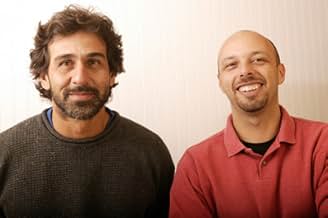IMDb RATING
7.8/10
8.9K
YOUR RATING
On June 12, 2000, a young man with a gun took the passengers aboard Bus 174 in Rio de Janeiro, Brazil hostage. This documentary examines the event itself, the resulting media frenzy, the pol... Read allOn June 12, 2000, a young man with a gun took the passengers aboard Bus 174 in Rio de Janeiro, Brazil hostage. This documentary examines the event itself, the resulting media frenzy, the police response, and the perpetrator's background.On June 12, 2000, a young man with a gun took the passengers aboard Bus 174 in Rio de Janeiro, Brazil hostage. This documentary examines the event itself, the resulting media frenzy, the police response, and the perpetrator's background.
- Directors
- Writers
- Stars
- Awards
- 21 wins & 9 nominations total
Sandro do Nascimento
- Self
- (archive footage)
Geísa Firmo Gonçalves
- Self
- (archive footage)
- Directors
- Writers
- All cast & crew
- Production, box office & more at IMDbPro
Featured reviews
I can't disagree more with the previous reviewer about this film. The subject is so completely eye opening for American's to see, I think it should be mandatory viewing for high school kids.
Rio de Janeiro is such a different kind of city compared to anything in our country. In the legal system, people are treated worse then animals. The police force is completely untrained. Thousands of homeless children walk the streets and are systematically murdered by police and people who are aggravated by their presence. To many people, killing off the homeless children is the only solution to a staggering social problem.
The kidnapper in "Bus 174" is a product of the city and the time. What started out as a basic robbery, became a hostage situation where social problems were brought to the attention of millions of people. He became an accidental spokesman for the plight of homeless children in Rio.
No one can guess how badly the police attempt to resolve the situation. It has become a case study for police all over the world on how a hostage situation can be poorly handled.
As a film, it kept my attention the whole time, and not using a narrator and letting the story unfold simply through interviews and news footage is classic documentary style. Too many filmmakers and news personalities put themselves into their films.
The filmmakers in "Bus 174" were able to capture the story of the hijacker, and the sociology of the city of Rio.
Rio de Janeiro is such a different kind of city compared to anything in our country. In the legal system, people are treated worse then animals. The police force is completely untrained. Thousands of homeless children walk the streets and are systematically murdered by police and people who are aggravated by their presence. To many people, killing off the homeless children is the only solution to a staggering social problem.
The kidnapper in "Bus 174" is a product of the city and the time. What started out as a basic robbery, became a hostage situation where social problems were brought to the attention of millions of people. He became an accidental spokesman for the plight of homeless children in Rio.
No one can guess how badly the police attempt to resolve the situation. It has become a case study for police all over the world on how a hostage situation can be poorly handled.
As a film, it kept my attention the whole time, and not using a narrator and letting the story unfold simply through interviews and news footage is classic documentary style. Too many filmmakers and news personalities put themselves into their films.
The filmmakers in "Bus 174" were able to capture the story of the hijacker, and the sociology of the city of Rio.
....shouts Sandro, the central character, to the voyeuristic TV cameras, as his real-life predicament spirals towards its tragic and brutal denouement.
And he's right - this film is far more compelling and dramatic than any Hollywood product - also far more poignant and touching.
Director Padhila shows extraordinary skill in building the story to an unforgettable climax. When I watched this movie at a Manchester cinema, there were only 30 or so people in the theatre - but the silence at the close of the film was astonishing. The entire audience walked out in stunned speechlessness.
If you were impressed by "City of God", check out this slice of real life from Rio de Janiero - a world-class piece of documentary-making, and a stinging indictment of the divisions that scar Brazilian society.
And he's right - this film is far more compelling and dramatic than any Hollywood product - also far more poignant and touching.
Director Padhila shows extraordinary skill in building the story to an unforgettable climax. When I watched this movie at a Manchester cinema, there were only 30 or so people in the theatre - but the silence at the close of the film was astonishing. The entire audience walked out in stunned speechlessness.
If you were impressed by "City of God", check out this slice of real life from Rio de Janiero - a world-class piece of documentary-making, and a stinging indictment of the divisions that scar Brazilian society.
This film is an example of in-depth journalism, the way it is not done in the mainstream, commercial media. Instead of focusing on the hijacking of the bus, which is the most attractive footage in this documentary, this documentary decides to explain the context and causes that led the hijacker to perform a suicidal, desperate action, such as hijacking a public bus in the middle of the day. It is an extremely delicate and elaborate work which attempts to present an all-encompassing picture, one that forbids taking sides easily. It is not excusing the perpetrator of the crime in any way, but, still, it is demonstrating how much information we are missing when we, for example, read daily crime reports in newspapers. Instead of playing on the card of the expected outrage over this drug-addicted person who clearly did something extremely wrong, this film will take you several steps further. By showing a more complete frame of Brazilian society in a fierce tour de force, the authors of this film make the spectator question his or hers opinions and attitudes over and over again. It is a documentary that sticks with you for more than one day.
In June 2000 a young man tried to rob a bus in Rio de Janeiro and ended up in a hostage situation as the police SWAT team surrounded the bus. However the police at first fail to control the situation, allowing crowds of the public and the media to gather right outside the bus putting the story at the top of every channel's output. The police gradually bring the situation outside under control but inside the pressure cooker of the bus things are only getting worse as the young man demands grenades, a rifle and a driver for the bus before starting to set deadlines for killing the passengers one by one.
I had never heard this story before watching this film so I had no idea where it was going or how it would end; in a way I suppose this makes it more engaging for me as a viewer because the main story was as good as the back story (the latter being the main thrust of the film). The opening credits sees the camera moving from the rich side of Rio down into the crowded and heaving slums and this start pretty much lays out the groundwork for a film that aims to highlight the total failure of any system in Brazil to deal with the rich/poor divide a divide that is extreme beyond understanding. The main action on the bus is interesting but what the film does well is to build on this by looking at the background of Sandro a background that is not uncommon among street kids. It deals with a complex range of issues and it poses many questions of the authorities.
It is not cheerful viewing because it can find no answers and it can find nothing here to give hope for the future. The social work system fails but the real failure highlighted here is the legal system and the police. The response to the bus hijacking is a shambles which ends badly due to the police and allegedly ends with them murdering Sandro in the back of the police van a crime which the jury found them innocent of. The point that nobody seems to care for the disenfranchised poor is further hammered home with startling footage of the prisons and a history of the Candelária massacre. The final credits shows that nothing really has happened and certainly a scan of the newspapers online suggest that not much has changed in the last six years. The contributions are mostly very good and everyone is pretty honest however the uses the archive footage to very good effect to present the hostage situation while also expanding the discussion to look beyond it.
Overall then this is not a film to come to if you are looking for a fun night in. However it is a fascinating documentary that starts with one compelling event and uses it to look at the wider problems inherent in Rio's problems. Those that found City of God riveting should watch this as it does the job just as well but does it by raising the debate above street level and exposes the system failures that condemn poor to death or even brings it to them as the norm. Fascinating stuff but about as downbeat and hopeless as you could imagine.
I had never heard this story before watching this film so I had no idea where it was going or how it would end; in a way I suppose this makes it more engaging for me as a viewer because the main story was as good as the back story (the latter being the main thrust of the film). The opening credits sees the camera moving from the rich side of Rio down into the crowded and heaving slums and this start pretty much lays out the groundwork for a film that aims to highlight the total failure of any system in Brazil to deal with the rich/poor divide a divide that is extreme beyond understanding. The main action on the bus is interesting but what the film does well is to build on this by looking at the background of Sandro a background that is not uncommon among street kids. It deals with a complex range of issues and it poses many questions of the authorities.
It is not cheerful viewing because it can find no answers and it can find nothing here to give hope for the future. The social work system fails but the real failure highlighted here is the legal system and the police. The response to the bus hijacking is a shambles which ends badly due to the police and allegedly ends with them murdering Sandro in the back of the police van a crime which the jury found them innocent of. The point that nobody seems to care for the disenfranchised poor is further hammered home with startling footage of the prisons and a history of the Candelária massacre. The final credits shows that nothing really has happened and certainly a scan of the newspapers online suggest that not much has changed in the last six years. The contributions are mostly very good and everyone is pretty honest however the uses the archive footage to very good effect to present the hostage situation while also expanding the discussion to look beyond it.
Overall then this is not a film to come to if you are looking for a fun night in. However it is a fascinating documentary that starts with one compelling event and uses it to look at the wider problems inherent in Rio's problems. Those that found City of God riveting should watch this as it does the job just as well but does it by raising the debate above street level and exposes the system failures that condemn poor to death or even brings it to them as the norm. Fascinating stuff but about as downbeat and hopeless as you could imagine.
I just saw this movie, and I cannot imagine a more terrifying, sad, and heartbreaking piece of film existing. this movie is simply devastating. I was sobbing within the first 20 minutes. A young man of 19(who looks about 50)hi-jacks a bus and we see the results of an agonizing life play out before our eyes. It is hard to watch, and hard not to deeply care for Sandro. I cannot put into words how heartbreaking and important this movie is. Sandro's life is irrevocably doomed, and we discover there are thousands almost exactly like him, roaming the streets of Rio, desperate and hungry for any kind of social acknowledgement. It should be required viewing for the human race.
Did you know
- TriviaIncluded among the 1, 001 Movies You Must See (Before You Die) (2014), edited by Steven Schneider.
- ConnectionsFeatured in 50 Documentaries to See Before You Die: Episode 4 (2011)
- How long is Bus 174?Powered by Alexa
Details
Box office
- Gross US & Canada
- $217,201
- Opening weekend US & Canada
- $8,625
- Oct 12, 2003
- Gross worldwide
- $222,506
- Runtime
- 2h 2m(122 min)
- Color
- Sound mix
- Aspect ratio
- 1.85 : 1
Contribute to this page
Suggest an edit or add missing content























